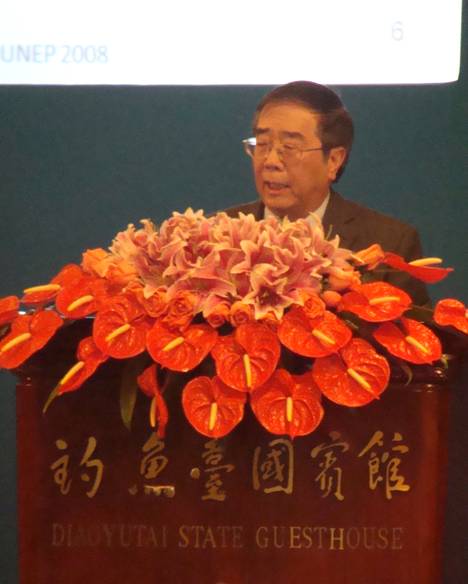China acts on mercury convention and management
The 2011 Annual General Meeting of the China Council for International Cooperation on Environment and Development (CCICED) was held in Beijing from November 15 to 17, 2011. The theme for this
 |
| Prof.CHAI delivers a report |
CAS Academician Prof. Chai Zhifang and Dr. Barry Stemshorn, Co-chairs of the Special Policy Study on Mercury Management in China, delivered a work report, which briefed about the latest development of mercury management in China, progress of inter-government negotiation on mercury convention and its impact on China. The report won praises from both domestic and foreign experts. CCICED adopted two pieces of its policy suggestions on mercury convention and management and would submit them to the State Council for final approval.
Mercury is recognized as a chemical of global concern due to its long-range transport in the atmosphere, its persistence in the environment, its ability to bioaccumulate in ecosystems and its significant negative effects on human health and the environment. At present, a total of 140 governments were unanimous in their decisions to start intergovernmental negotiations with the aim of preparing a global mercury treaty. China, as the largest country in the world in producing, using, and emitting mercury is also requested to reduce its mercury pollution and make contributions to the global mercury convention.
At the CCICED's 2010 annual meeting, a research team on the Special Policy Study on Mercury Management in China was formed. Consisting of 13 renowned Chinese and foreign scientists from CAS institutes, Peking University, Ottawa University, USA Environment Protection Administration, etc, this team would mainly engage in studying mercury and mercury-related industry in China and its impact on human health and social economy, and make policy suggestions on mercury convention and management in China.
As the Chinese representative unit under this project, the Institute of High Energy Physics (IHEP) completed the overall design and the report editing and compiling of the project, and was in charge of analyzing both the Chinese and foreign techniques in mercury convention, the related administrative system and disposal of mercury-related materials.
Since 1970s, IHEP scientists have made full use of the platforms of nuclear analysis and synchrotron radiation to conduct a series of on-site research in different provinces of China. Many scientific achievements were published on high-level journals such as Environmental Health Perspectives,Clinical Chemistry,Environmental Science and Technology,Analytical Chemistry,Journal of Analytical Atomic Spectrometry, Chemosphere, Toxicology Letters, Talanta and Science of the Total Environment, etc.

